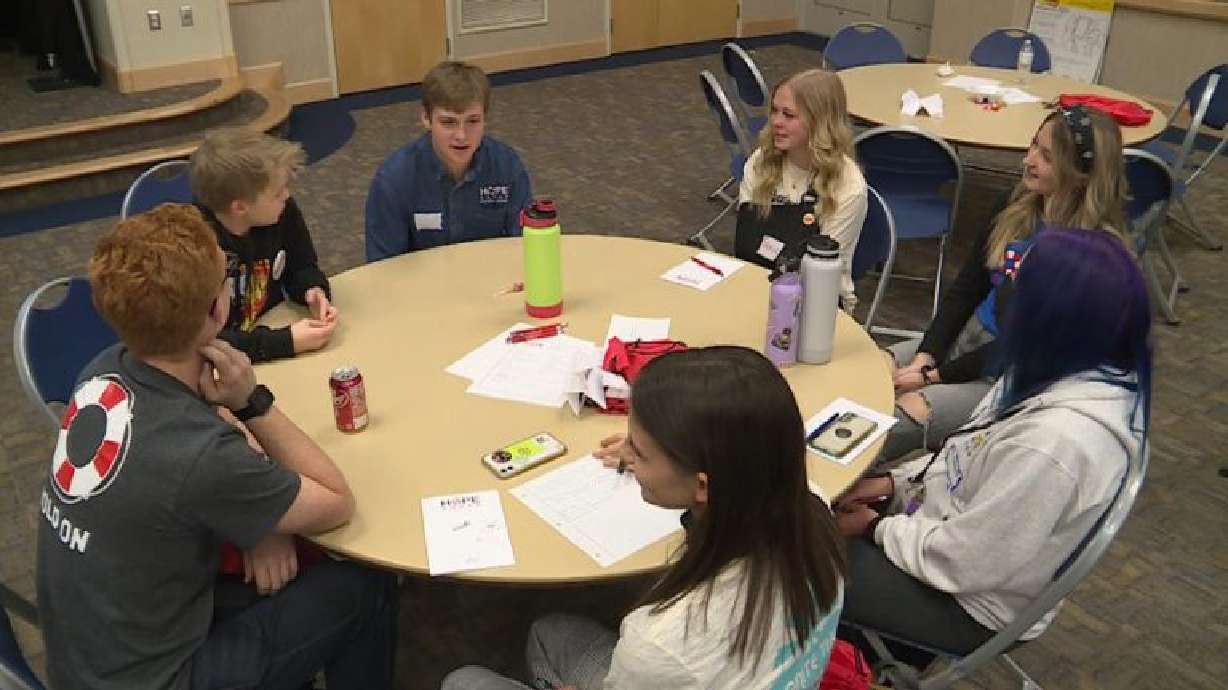Estimated read time: 3-4 minutes
This archived news story is available only for your personal, non-commercial use. Information in the story may be outdated or superseded by additional information. Reading or replaying the story in its archived form does not constitute a republication of the story.
PROVO — About 200 students traveled to Provo on Thursday for training on how to help prevent suicide at their schools through a Hope Squad.
"The Hope Squad is kind of the eyes and ears of the school," said Gabe Wood, a senior at Pleasant Grove High School. "We look out for kids and if there is somebody that we're worried about or concerned about we'll tell a counselor. We know to tell a trusted adult."
The students from Utah, Idaho, and Wyoming attended the five-hour training at Scenic View Academy to learn how to be Hope Squad leaders.
"Having Hope Squad erases the stigma," said Fehmy Suliman, a sophomore at East High School. "It at least helps you erase the stigma that being able to talk to others is not embarrassing. It's not a bad thing to do. I think it's really healthy."
The school-based program trains students to notice when a fellow student is at risk of suicide and to also look out for the overall mental health of their peers.
"We're afraid to talk about suicide because we think that if we talk about it, it's going to give someone the idea," said Hope Squad founder and executive director Greg Hudnall. "But in reality, talking about it can be one of the best things to reduce stigma and that it's okay to get help and that's what we teach these young people."
The training comes during a difficult week as Utah is mourning the loss of 10-year-old Izzy Tichenor. Her family said she died by suicide and that she was bullied at school.
"When you lose a child it impacts you," Hudnall said, "and we do know that of all deaths, suicides are the most preventable."
Hudnall said the goal is to have a Hope Squad in every elementary, middle and high school. So far, about 400 Utah schools have one. Overall, about 1,100 schools have a Hope Squad.
"It's really cool to know that it's bigger than my school," said Munashe Tanjani, a sophomore at Hillcrest High School.
Tanjani said that by being involved in Hope Squad she is able to help friends and fellow students and connect them with help.
"No matter who you are, no matter your skin color, your race, your creed, your sexual orientation, you can get help and there are people who love you and want you to be here," she said.
Students said Hope Squad helps them remember that simple acts of kindness and communication can help their classmates during a difficult time.
"They save so many lives — more than we know," said Emma Parkin, East High School's Hope Squad president. "I don't think many people realize what someone saying 'Hi' means to them or shooting them a text that's like, 'Hey, hope you're doing well.'"
"We learn from the students. They're the leaders," said Hope Squad advisor Toni Broadhead from Stansbury High School.
Broadhead said the program helps students know that they are being heard.
"And when they say that they're hurting, we should be listening," she said.
For more information about the Hope Squad program, visit hopesquad.com.
Suicide prevention resources
If you or someone you know is struggling with thoughts of suicide, call the suicide prevention hotline at 1-800-273-TALK.
Crisis Hotlines
- Utah County Crisis Line: 801-691-5433
- Salt Lake County/UNI Crisis Line: 801-587-3000
- Wasatch Mental Health Crisis Line: 801-373-7393
- National Suicide Prevention Lifeline: 1-800-273-TALK (8255)
- Trevor Project Hotline for LGBTQ teens: 1-866-488-7386
Online resources
- NAMI Utah: namiut.org
- Utah Chapter-American Foundation for Suicide Prevention: afsputah.com
- Suicide Prevention Lifeline: www.suicidepreventionlifeline.org
Warning signs of suicide
- Talking about wanting to die
- Looking for a way to kill oneself
- Talking about feeling hopeless or having no purpose
- Talking about feeling trapped or in unbearable pain
- Talking about being a burden to others
- Increasing the use of alcohol or drugs
- Acting anxious, agitated or recklessly
- Sleeping too little or too much
- Withdrawing or feeling isolated
- Showing rage or talking about seeking revenge
- Displaying extreme mood swings
The more of these signs a person shows, the greater the risk. Warning signs are associated with suicide but may not be what causes a suicide.
Information from the American Foundation for Suicide Prevention.
What to do if you see warning signs of suicide
- Do not leave the person alone
- Remove any firearms, alcohol, drugs or sharp objects that could be used in a suicide attempt
- Call the U.S. National Suicide Prevention Lifeline at 800-273-TALK (8255)
- Take the person to an emergency room or seek help from a medical or mental health professional
Information from the American Foundation for Suicide Prevention.









